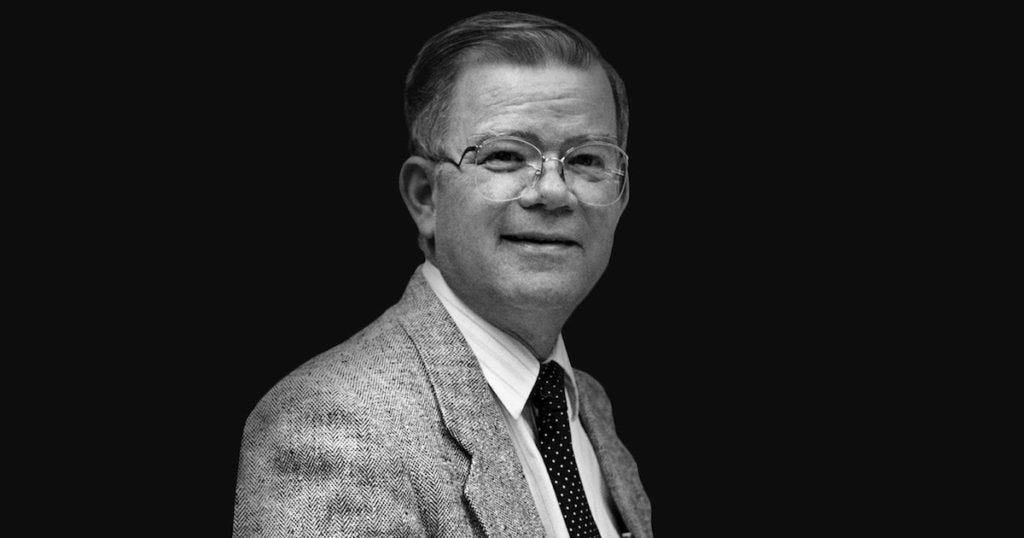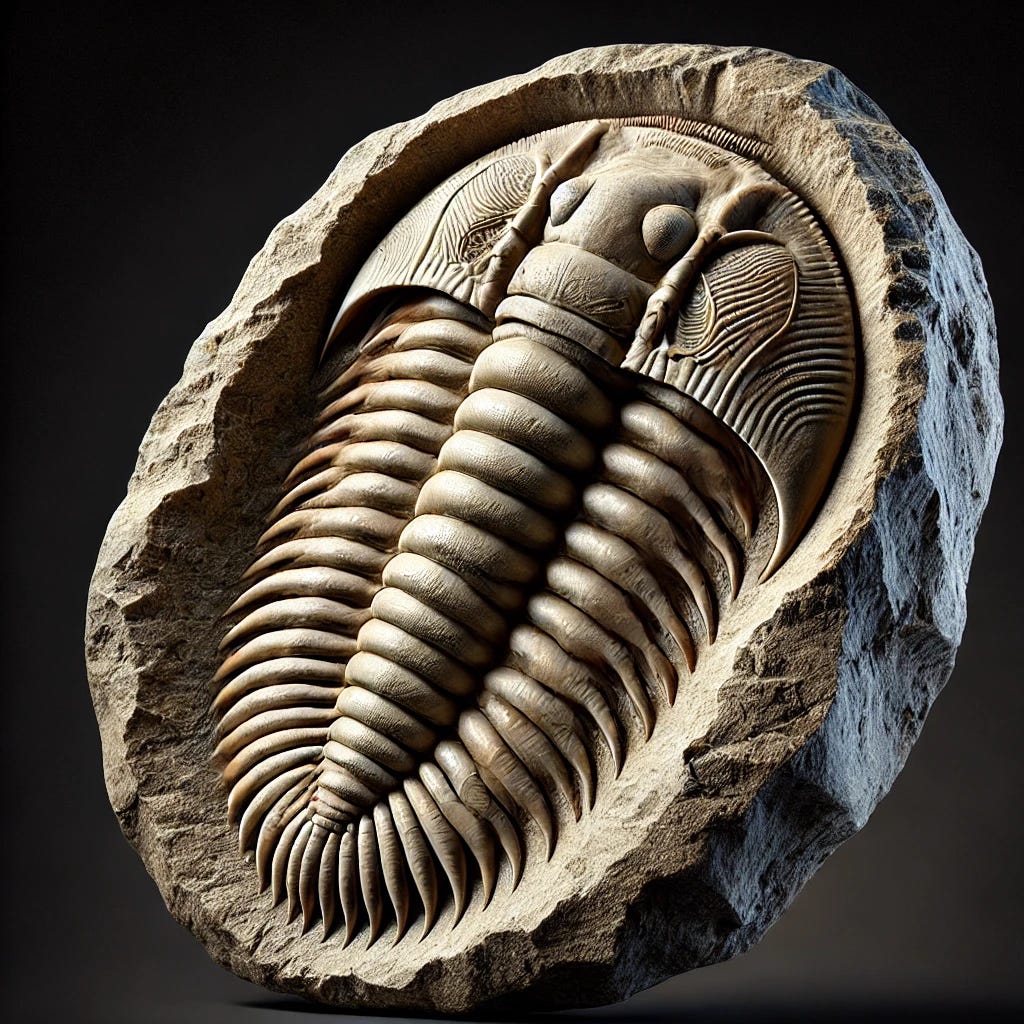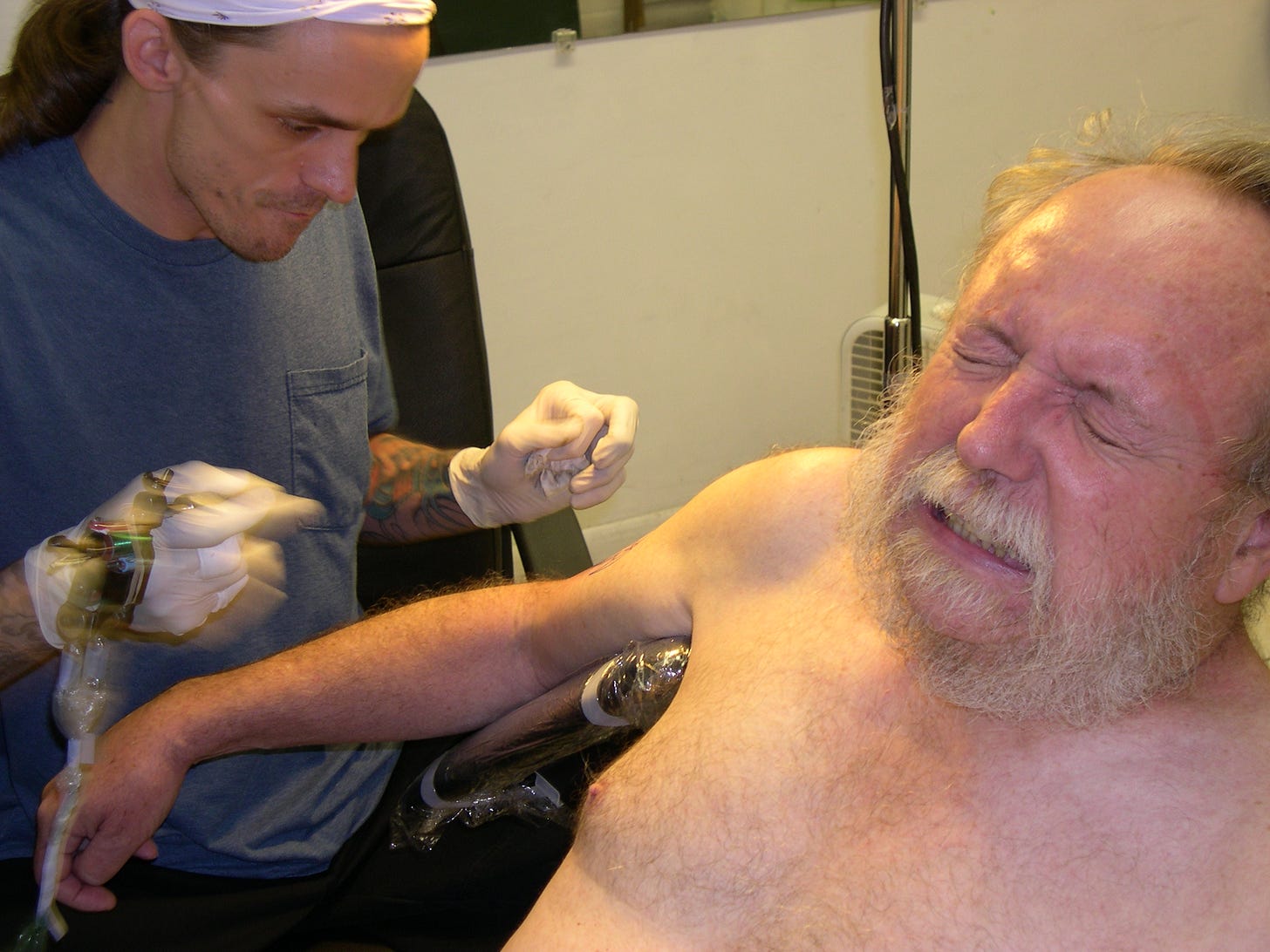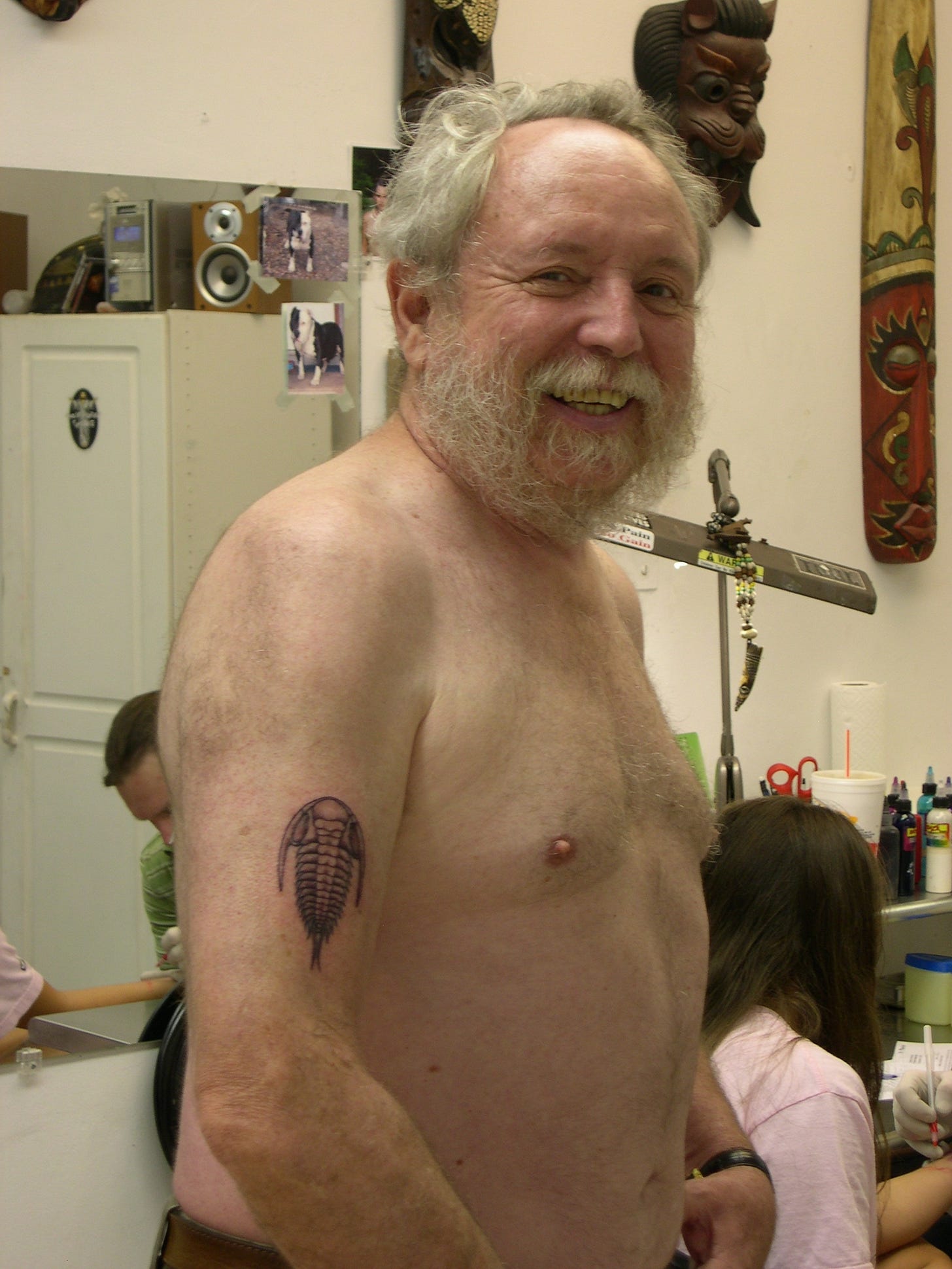Remembering Michael Ruse
Philosopher of biology Michael Ruse died Friday, November 1, 2024. Paradoxically, he was ardent in his Darwinism, mild in his atheism, and fair-minded to intelligent design.

Philosopher of biology Michael Ruse, a good friend and colleague of mine, died this Friday, November 1, 2024. We found ourselves on opposite sides of how to explain biological origins. He took a pro Darwinian view, I took a pro intelligent design view. We published an anthology in 2004 with Cambridge University Press that featured Darwinists, intelligent design theorists, theistic evolutionists, and self-organizational theorists: Debating Design: From Darwin to DNA. Besides this book, we also debated regularly on college campuses throughout the early and mid 2000s.
However much we disagreed, these were always joyous encounters. We continued to correspond over the years, with him periodically sending me his latest book (he was immensely prolific). With the 20th anniversary of our Cambridge anthology happening this year, UK podcaster Subboor Ahmad invited us to his podcast to discuss where the conversation about Darwinism and intelligent design had gone in the intervening years. It was the last time I interacted with a live, even if virtual, version of Michael:
Others certainly knew Michael better than me. Yet I got to see him from the vantage of someone whose views clashed with his (rather than the vantage of like-minded colleagues). In my experience, he never lost his good will or his eagerness for free, respectful, and open discussion, even on topics where he thought the other party was completely and hopelessly misguided, as he did about my embrace of intelligent design. To be fair, I thought his embrace of Darwinism was likewise completely and hopelessly misguided. But before or after a debate, we’d go out for a convivial dinner. Unlike some debates I’ve had with opponents of intelligent design, I never had the sense with Michael that we were keeping score and adding up points to determine a winner. We were there to have a conversation, and we welcomed our audience to eavesdrop.
I first got to know Michael in the spring of 1992 in Dallas. Jon Buell of the Foundation for Thought and Ethics, along with two other non-profits (Dallas Christian Leadership and the C.S. Lewis Fellowship), arranged for a symposium featuring Phillip Johnson and Michael Ruse. Johnson had just published his immensely popular and influential book Darwin on Trial. Michael and Phil were the keynoters at this event, each giving keynote presentations and then engaging in a formal and transcribed debate. In addition, we had four or five commenters on both the Darwinian side and the intelligent design side to interact with each other and with Michael and Phil. It was at this event that I first met Phil as well as Michael Behe, Stephen Meyer, Walter Bradley, and Peter van Inwagen. There may be some video of this event somewhere, but a symposium proceedings was published and is still available on Amazon under the title Darwinism: Science of Philosophy?
I wasn’t sure what to make of Michael when I first met him and saw him in action. That said, I wasn’t sure what to make of Phil Johnson either when I first met him—a lawyer taking on biological evolution, really? Both ended up as my friends. And both are now sadly gone (here’s my remembrance of Phil). At the Dallas meeting, Michael struck me as full of himself but also as not taking himself too seriously. He was refreshingly assertive, as when someone in the audience asked him a gotcha question to make him look foolish. He wasn’t having it and called him out. In writing this reflection, I’ve tried to come up with a single word that captures my recollection of Michael at our first encounter and then in the subsequent decades of our friendship. I’ve settled on exuberance. He enjoyed life and he enjoyed people, and not in a reserved or modest way but with spirit and gusto.
The funniest incident I recall with Michael occurred at a Greer-Heard Point-Counterpoint Forum that took place in Georgia in February of 2006. Let me give some background. The Greer-Heard forum was a generously underwritten annual event featuring two speakers taking opposite sides on an important cultural issue. The first such forum occurred in 2005, pitting John Dominic Crossan against N.T. Wright concerning the historicity of the biblical accounts about Jesus, Crossan taking the skeptical view, Wright arguing for the traditional view.
The second forum was between Michael and me. It took place the following year, focusing on intelligent design. Robert Stewart, a theology professor at New Orleans Baptist Theological Seminary, organized the forum and published a book on it through Fortress Press (2007). The book presented Michael’s and my contributions to the forum, but also contributions of others, both pro and and anti intelligent design. The volume Stewart published was titled Intelligent Design—William A. Dembski and Michael Ruse in Dialogue, and it can be purchased to this day on Amazon.
This forum provoked a remark from Michael that I found hilariously funny and that’s etched into my memory. But first, some additional context. Our exchange took place around the time that the new atheists, as they came be called, started picking up steam. Richard Dawkins’ The God Delusion would be published later that year. But Dawkins’ full throttle assault against theism and his case for atheism were already before the public consciousness. In particular, Dawkins’ two-part documentary on behalf of atheism had just been released January of 2006, the first part titled The God Delusion, the second part titled The Virus of Faith, all under the umbrella of The Root of All Evil? (Note that I found the first of these parts especially useful in courses I taught on apologetics):
In any case, Michael wanted nothing to do with the harsh atheism of Dawkins and his fellow horsemen of the atheistic apocalypse, as they also came to be called (Christopher Hitchens of God Is Not Great, Daniel Dennett of Breaking the Spell, and Sam Harris of The End of Faith). That said, it would be inaccurate to characterize Ruse as trying to reconcile science and religion, except in a way that shortchanged religion. In his book Can a Darwinian Be a Christian? (Cambridge, 2004, p. 96), he would write:
Even the supreme miracle of the resurrection requires no law-breaking return from the dead. One can think Jesus in a trance, or more likely that he really was physically dead but that on and from the third day a group of people, hitherto downcast, were filled with great joy and hope. That a psychologist or sociologist might be able to explain all of this by natural laws is totally irrelevant — something of a relief, actually. What counts is that it happened and that it was unexpected and that it mattered. Conjuring tricks are beside the point. It is from this regeneration of spirit that true Christianity stems, not from some law-defying physiological reversals in the early hours of a Sunday morning.
Any but the least traditional Christians would find this dismissal of a real bodily resurrection of Jesus as unacceptable and irreconcilable with Christian orthodoxy. And yet, where Dawkins saw only delusion, Michael still saw something of value, even if the resurrection of Jesus could not be grounded factually. Unlike Dawkins, whose childhood experiences with Christianity were quite negative, Michael came from a Quaker background that he regarded as positive, and which I sensed he still at some level wanted to be true.
Michael therefore reacted viscerally against the stark atheism of Dawkins, who saw Christianity’s wholesale destruction as an unmitigated good for humanity (ironically, Dawkins, having more recently to deal with woke lunacy, is now softening toward Christianity, now calling himself a cultural Christian). The following paragraph from Wikipedia perfectly captures Michael’s reaction to the new atheists:
Ruse has engaged in heated exchanges with new atheists. According to Ruse in 2009, “Richard Dawkins, in his best selling The God Delusion, likens me to Neville Chamberlain, the pusillanimous appeaser of Hitler at Munich. Jerry Coyne reviewed one of my books (Can a Darwinian be a Christian?) using the Orwellian quote that only an intellectual could believe the nonsense I believe in. And non-stop blogger P. Z. Myers has referred to me as a ‘clueless gobshite.’” Ruse said new atheists do the side of science a “grave disservice,” a “disservice to scholarship,” and that “Dawkins in The God Delusion would fail any introductory philosophy or religion course,” and that The God Delusion makes him “ashamed to be an atheist.” Ruse concluded, saying “I am proud to be the focus of the invective of the new atheists. They are a bloody disaster.”
Okay, with all this stage-setting, let’s finally get to the funniest incident I recall with Michael. At the Greer-Heard forum, the topic of heaven came up, a heaven of eternal bliss compatible with theism and incompatible with atheism. Here is how Michael described heaven: “I would love for heaven to be real. Heaven for me would be a new Mozart opera every night and fish-and-chips during intermission.” Funny, yes? As it is, at our podcast interview together with Subboor Ahmad in early 2024, Michael was going to a Mozart opera that night. He wasn’t going to miss it even though he was breathing oxygen through a nasal cannula during the interview and would need the additional oxygen that night at the opera.
I found Michael’s vision of heaven amusing but perhaps closer to truth than he might have imagined. In Catholic priest Thomas Dubay’s The Evidential Power of Beauty (a book I used in some of my graduate seminars on theology and science), Dubay also sings the praises of Mozart as a window into the divine. While it may be hard to imagine that any activity could be continued for all eternity without engendering boredom, the appreciation of beauty—a never ending progression of ever increasing visions of beauty—seems immune to the boredom problem. In his humor, Michael therefore also made a profound point.
The incident with Michael that made the greatest impression on me, and which showed me the depth and kindness of his humanity, occurred at the University of Central Arkansas in the fall of 2003. It was a symposium featuring the two of us, so we had presentations to make. But we also had lots of interactions with students, especially students from the honors college. At the opening dinner, about thirty honors students were seated at tables in a plush hall. Before the dinner was served, Michael went to each student individually and shook hands, asking with genuine interest about each of them. It was heart warming.
Another incident that stood out to me from the symposium at the University of Central Arkansas was when Michael, seated in conversation with faculty and students, took off his sweater and undershirt, leaving him bare-chested. I don’t recall what prompted Michael to remove his upper-body clothing, but it wasn’t gratuitous and the students loved it. Michael was an uninhibited spirit.
It seems that Michael had a penchant for showing off his chest. In 2007, he emailed me, Phil Johnson, and about twenty others (including evolutionists such as David Hull and Richard Dawkins), sending us several images of himself getting and showing off a newly minted tattoo. It’s been many years, so I don’t recall the exact backstory. I vaguely recall that Michael may have lost or won bet, or somehow had been challenged by his students to get a tattoo of something evolutionarily significant. He chose a classic organism from the Cambrian, namely, the trilobite (one of the first arthropods, which had a hard exoskeleton):
Here are the images of Michael getting his trilobite tattoo, showing the ordeal that it was (as evident in the pain on his face) as well as his satisfaction once the ordeal was over. As Michael put it in the email alerting us to his new tattoo: “I now expect my intelligent design friends to have Jesus tattooed on their right arms.” As it is, I never felt obligated to meet that expectation. But I was happy for Michael in the pleasure he took in his tattoo:
If some of my remembrances of Michael seem frivolous, he was also a serious defender of academic freedom and expression. In the last months before his death, he and I were trying to complete one more project on the controversy between Darwinism and intelligent design. I sensed that this might be his swan song—his usual energy on past projects was not there and it largely fell to me to try to pull this project together. In any case, for this project we needed to enlist several Darwinists. I expected with Michael’s extensive rolodex in that world that enlisting the needed Darwinists would be easy. It wasn’t.
I don’t mean to be cagey about this project, but it still has a chance of coming to light, and I hope it does for my sake and Michael’s as indeed a fitting swan song for all his efforts to promote freedom of thought and expression on the questions that most animated him. All that to say, I won’t at this moment be divulging information about the precise details of this project. And yet, I will share an exchange that Michael had with a prominent Darwinian biologist in trying to enlist this biologist to our project.
At the time, Michael forwarded to me the exchange, though he asked me not to circulate it. But with his passing, I no longer feel the need to keep this exchange secret. Notwithstanding, I won’t disclose the identity of the biologist in question. My point is not to embarrass anyone. Rather, my point is to underscore how freedom of thought and expression in the academy are regularly suppressed, and that it takes the courage of a Michael Ruse to stand against such suppression.
Here’s how the biologist in question responded to a request to contribute to our project. In the interest of keeping the precise nature of the project as well as the biologist in question confidential, I’ve made a few excisions, clearly marked with brackets and ellipses:
=====Begin email from biologist to Michael, dated August 17, 2024=====
Dear Michael,
I hope this finds you well.
[Your assistant] wrote me to ask for a contribution to what he said was a project planned by you and William Dembski…
I was curious about the scope of this project, so I wrote to inquire to a set of people who were involved in the Dover trial. These included [omit names of seven prominent opponents of intelligent design]. [All these] who participated in the trial … were dismayed, to say the least.
They individually expressed a range of reasons why this would be a terrible idea.
-- There is nothing new, either scientifically (there never was) or polemically with respect to ID in the past 20 years.
-- The original proponents of ID have mostly either scattered to the winds or have labored in quasi-academic obscurity. (I will not characterize Dembski’s abstract mathematical work of the past decades, other than to offer the view that they have nothing to say about evolution or science.) There still has never been a peer-reviewed scientific publication by an ID proponent. No one could think of “new” issues or aspects of ID that have emerged. What is the definition of a dead horse?
-- We live in a far greater era of disinformation and fakery than we lived in 20 years ago. If ID was a “Trojan horse” and a construct of smoke and mirrors then, how much easier will it be to gull a substantial portion of the populace now? How will this help the cause of science and science education – or even, if you want to assume your philosopher’s mantle, the cause of explaining legitimate philosophy?
-- In Dover and in other districts, conservative Christians are determined to relitigate the ID battle. They are using the same tactics of bringing in persuasive lawyers, soliciting school board members, and launching advertising campaigns to voters. They are also assaulting textbooks. Ken Miller’s biology text was criticized in Texas for chapters that dealt with Covid-19 (which was alleged by critics not to be a disease), vaccinations, and the absence of a balanced treatment of ID with evolution. How will your planned publication help with this, apart from helping the ID proponents claim that scientists are taking them seriously?
-- One of our colleagues remarked: “since 2004, when Debating Design: From Darwin to DNA first appeared, Dembski has repeatedly evinced inappropriate behavior -- failing to address pertinent criticism, refusing to admit error, insulting his opponents, etc. -- that should make anyone leery about participating in an ostensibly scholarly enterprise with him. After twenty years (or more) of not playing nicely with others, he can hardly expect eager cooperation at this stage.” As another pointed out, your past collaborations with Dembski have allowed him to pose as a mainstream academic, which some regard as a debatable claim. Setting aside any abstract mathematical contributions, on which I do not comment, he has no relevance to any inquiry about evolution or science in general.
-- The Discovery Institute and its friends would like nothing better than the academic legitimacy that you would collude with in … this pseudo-debate. This may not matter to you, because you may feel that open discussion is of general interest to the public and salutary to its understanding of issues central to human endeavor. If so, that view seems short-sighted. We who sacrificed years of effort to explain, test, and ultimately counter the pretensions of ID as science, which was instantiated in Judge Jones’s 142-page decision in which not a single sentence validated any of the arguments of the ID proponents, will not thank you for giving comfort to these opponents of science and rational thought, even as their legal and administrative minions redouble their efforts to overturn everything that we accomplished.
Please abandon this project, if for no other reason than for the sake of respect for your colleagues who sacrificed a great deal – professionally, personally, and financially, in some cases – to defend science.
Thanks for your consideration, and hope you are well.
[SNIP — signature omitted]
=====End email from biologist to Michael, dated August 17, 2024=====
Here is how Michael responded. Note that Michael was a key expert witness in the 1981 Arkansas creation trial (McLean v. Arkansas Board of Education), which he cites at the end of his email below and notes that it incurred for him also a professional cost. The Dover trial mentioned above was decided in 2005.
=====Begin response from Michael to biologist, dated August 17, 2024=====
Goodness – I don’t think I have ever been solicited/begged by a letter such as yours – I am not a sociologist so I cannot report on the fate of IDT today – new conceptual changes, number of enthusiasts and so forth – what I can say is that a year ago I flew to Krakow in Poland to debate Michael Behe – there were about three hundred in the audience – at least half of whom were either priests or nuns – I estimate there were about five in the audience who agreed with me! I didn’t take offence – nothing personal – philosophers don’t take offence at different conceptual issues – I am not a Thomist, but I have deep respect for St Thomas as a theologian/philosopher.
I guess that is why I am not inclined to accede to your earnest pleading – if I were a scientist, it would be one thing – but I am a philosopher and I think it is a moral obligation to take on Dembski and the ideas he endorses/promotes – there are important issues here about the science-religion relationship and it is legitimate for a science to admit to the influence of religion – Dawkins would obviously say “no” – I am not at all sure that Dobzhansky or Fisher would agree – our [project has yet to be completed] , but if I were still teaching – I am 84 and now retired after 55 years in the classroom (in the job beyond my dreams) – I would use it as the focus of a graduate seminar on the science and religion interface -- more than teaching it, I would want to take it for credit!
And that I guess is why you are glad not to be a philosopher and why I could never be other than a philosopher.
Michael
“Please abandon this project, if for no other reason than for the sake of respect for your colleagues who sacrificed a great deal – professionally, personally, and financially, in some cases – to defend science.”
With respect, I am a little offended that the contributions of others are considered pertinent whereas my contributions (and costs) go unmentioned – if you look at the volume I published after Arkansas – But is it Science? – just see what my fellow philosophers like Larry Laudan said about me -- obviously they did not deter me then and they do not deter me now.
=====End response from Michael to biologist, dated August 17, 2024=====
This exchange, of course, raises many questions about the legitimacy of intelligent design as a coherent intellectual and scientific position. Addressing such questions is for another day and time—I would urge readers with such questions to start by consulting the second edition of The Design inference, which I co-authored with Winston Ewert.
But let me close this remembrance with the following thought: If intelligent design is a legitimate, and possibly even correct, view of biological origins, how could we ever know that if it is suppressed in the way that this biologist urged Michael to abandon his project with me? Michael and I differed sharply on the merits and truth of intelligent design. But he was a valiant defender of freedom of thought and expression, letting inquiry proceed where it will and following evidence to its ultimate destination—however distasteful that might be.
I loved Michael. I will miss him.










Thank you for this thoughtful memorial. Your friendship with Ruse, along with your respectful manner of engagement, may, in the long run, bear even more fruit than all the arguments in favor of ID.
Bill, a beautiful 'témoignage'.
Goes to show we can be intellectual 'enemies' yet still retain some shared humanity in being good friends.
As for the tatoo, he must have lost a bet. The trilobite looks to me like the perfect precambrian symbol for the beautiful paired compound eyes as 'archetype' instead of 'ancestor'!
Marc Mullie
Ophthalmologist